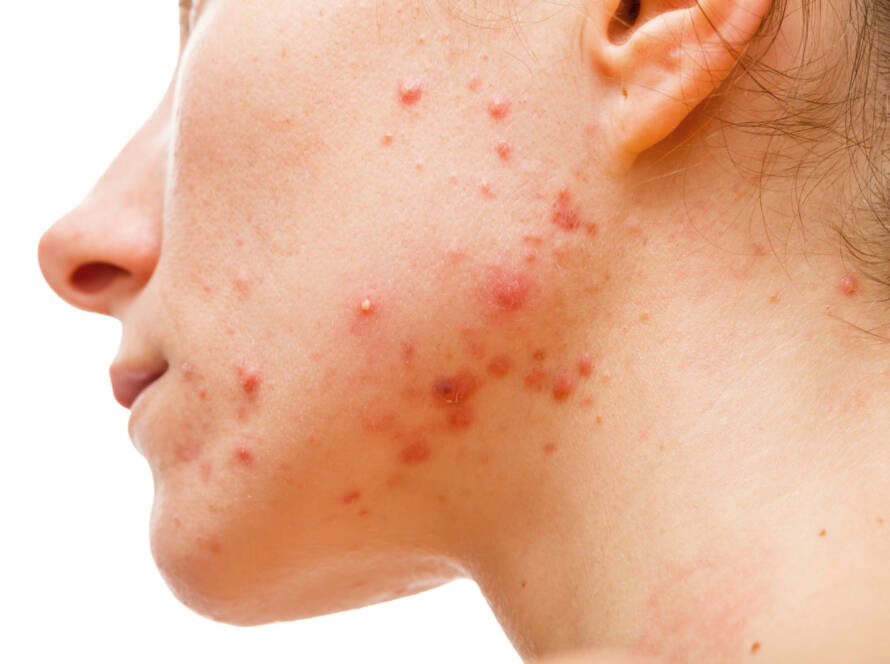What is Rosacea?
Rosacea is a prevalent skin condition that primarily affects the face. It’s characterized by flushing, redness, obvious blood vessels, tiny pimples (papules), small cysts filled with pus (pustules), and occasionally thickening of the skin, particularly around the nose.
However, it may also cause eye irritation. The most frequent cases are in middle-aged adults with fair-skinned eyes, blue skin, and blonde hair, but it can be a problem for people with any type of skin.
There are four distinct types of rosacea, each characterized by specific symptoms:
- erythematotelangiectatic rosacea (redness)
- Papulopustular rosacea (red bumps and pustules)
- Phymatids rosacea (skin thickening)
- Ocular rosacea (eye redness and irritation)
Do You Require Prescriptions for Rosacea?
There are several creams to treat rosacea that you can buy over the counter. However, if you have used those and you have not obtained the results you have hoped for, then you should consult a dermatologist to get prescription-strength treatment creams.
So, How Do I Eliminate the Rosacea Forever?
Since rosacea is a long-lasting disease, it is impossible to eliminate it. But it’s essential to realize that the degree of your symptoms will differ over time based on various factors. However, when you have the proper treatment, you can keep the symptoms under control energetically.
If you think you have rosacea, you should seek out a dermatologist online for an accurate diagnosis and treatment.
Over-the-Counter Acne Products
- Peroxide Benzoyl against salicylic acid
- Glycolic acid Vs salicylic acid
- Glycolic acid, as well as the retinol
- Salicylic acid as well as Lactic acid
Which Is the Desirable Treatment For Rosacea?
The symptoms and severity of the illness will vary from one individual to the other. The severity and symptoms of the condition will vary from person to person. There is no universal treatment that works for everyone.
However, treatment for rosacea generally involves topical or oral medications, lifestyle adjustments, and a skin-care routine specific to individual signs.
Medicines used in treating rosacea
Alpha-adrenergic agonists for topical use
Alpha-adrenergic agonists for topical use (such as oxymetazoline hydrochloride or Brimonidine) are commonly used in dermatology to enlarge blood vessels and decrease the face’s redness and flushing associated with rosacea.
Ivermectin Cream
Ivermectin cream is approved for treating the papulopustular lesions of Rosacea. It has anti-inflammatory and anti-parasitic properties but does not contain antibiotics, reducing antibiotic resistance risks. Topical ivermectin can treat inflammatory pustules and papules of moderate to severe rosacea.
Azelaic Acid
Azelaic acid is a topical medication used to treat papules and pustules in moderate to mild Rosacea of moderate to mild. It’s available on prescription in gel and foam formulations with a 10- to 20% formulation.
Topically Applied Antibiotics
Topical antibiotics, such as metronidazole and clindamycin6, can be an initial treatment option for moderate to mild papulopustular rosacea.
Tetracycline Class Antibiotics
Dermatologists might prescribe oral antibiotics at low doses (such as minocycline, doxycycline, or Tetracycline) for severe to moderate rosacea. These medicines may treat redness and inflammation systemically.
Cream Encapsulated with Benzoyl Peroxide
Encapsulated benzoyl-peroxide is a brand-new topical treatment that treats mild or moderate inflammation and papules of inflammation. Rosacea is mild to moderate. Even though benzoyl Peroxide frequently dries skin with rosacea, its encapsulation permits the drug to be effective and not irritate the skin.
Sulfacetamide Sodium as Well as Sulfur Cream for Topical Use
Combining sodium sulfacetamide with sulfur for topical treatment has proven efficient in treating rosacea, acne, and seborrheic acne. In addition, the medication is usually well tolerated in people suffering from the condition.
Does Tretinoin Work for Rosacea?
Tretinoin isn’t utilized for treating rosacea. But you can use tretinoin, even though you suffer from rosacea. However, this is only after your symptoms go away.
How Long Will It Take to Eliminate an Outbreak Of Rosacea?
The process of getting rid of an outbreak of rosacea could take anywhere from one week to many months (or sometimes even months), depending on the degree of the flare, how closely you follow the instructions given by your dermatologist, and how your skin reacts to the treatment.
How Do I Obtain Medication for Rosacea?
You can schedule the opportunity to have a virtual consultation with a dermatologist. All you have to do is take a few pictures and answer a few questions. The dermatologist will reply to you within a few days and give you a prescription.
Final Takeaway
Although it is impossible to completely eliminate rosacea with proper treatments and lifestyle adjustments, you can reduce the symptoms on a more or less permanent basis.
However, it’s important to schedule a consultation with a dermatologist so they can provide you with the correct diagnosis and treatment plan for the specific signs and symptoms you experience and the type of skin you have.



